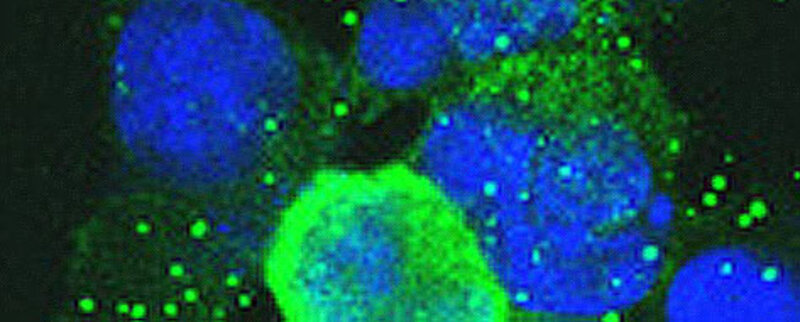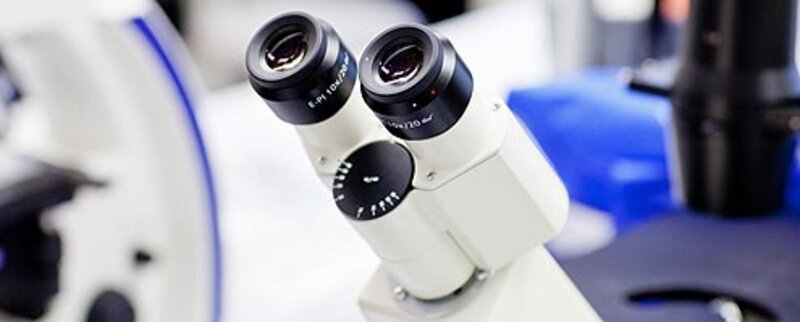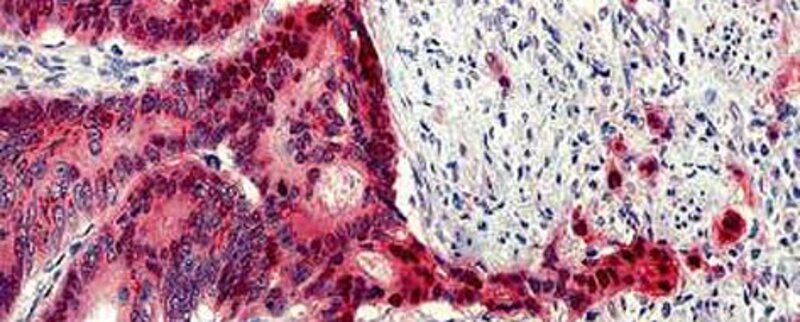Our Research Emphases
An overview of all currently funded collaborative/large-scale projects can be found on the website of the Faculty of Medicine at the University of Freiburg.
The various research infrastructure facilities acknowledged by the Faculty of Medicine are listed on this overview page.
Scientists involved in patient-oriented research in Freiburg will find a guide to helpful structures and services here.

Biological signaling processes form the basis of life for all cells in an organism. They also play a decisive role in the development of many diseases. Understanding these processes is therefore of fundamental importance for medical research. In the Cluster of Excellence "Centre for Integrative Biological Signalling Studies (CIBSS)", scientists from the University Medical Center Freiburg and the Faculty of Medicine are investigating communication within and between cells. The Collaborative Research Center "Nephrogenetics" is investigating how defective genes and proteins affect the development and function of the kidney.

The human immune system has evolved to fight off infections. However, if it is not properly controlled, it can also turn against its own body and lead to severe inflammation. This is why researchers at the Faculty of Medicine and the University Medical Center Freiburg are seeking to understand the human immune system by investigating infectious diseases such as hepatitis, staphylococci and influenza as well as inflammatory diseases such as multiple sclerosis, rheumatism, graft-versus-host reactions and inflammatory bowel diseases in the Collaborative Research Centre "Impath - Immunopathology as a Consequence of Restricted Immune Reactions". In the Collaborative Research Center / Transregio "Perinatal Development of Immune Cell Topology (PILOT)", scientists are investigating how a baby's immune cells prepare to defend against pathogens during pregnancy and birth and how external influences shape the immune system immediately after birth.
The Centre for Chronic Immunodeficiency, which is unique in Germany, is a particular focal point. All scientific expertise in the field of immunodeficiency is brought together here in Freiburg. A separate Institute for Immunodeficiency (IFI) was also founded to strengthen the field. The aim of the physicians and scientists is to better understand the causes of immunodeficiency and thus improve the diagnosis and treatment of immunodeficiency diseases.

Epigenetics is a relatively new field of research that deals with mechanisms of heredity that go beyond genetic determination. These changeable epigenetic patterns are influenced by changing environmental conditions such as diet, stress and medication. Analyzing these patterns can contribute to a better understanding of the development of diseases and can point to new ways of diagnosis and treatment. Based on the Collaborative Research Center "Medical Epigenetics - From Basic Mechanisms to Clinical Applications", the Faculty of Medicine at the University of Freiburg and the University Medical Center Freiburg, in collaboration with the Max Planck Institute of Immunobiology and Epigenetics, have developed into an internationally visible center for this highly topical branch of research.

Tumor research has a long tradition in Freiburg. The German Research Foundation has already funded many special research areas (SFB) on oncology at the University Medical Center Freiburg. The results of tumor research are implemented in patient care at the University Medical Center. The Tumor Center - Comprehensive Cancer Center Freiburg, one of the top oncology centers in Germany recognized by German Cancer Aid, and the German Consortium for Translational Cancer Research with its location in Freiburg play an important bridging role.

One in three people is affected by a neurological disease such as Parkinson's or epilepsy in the course of their lives. Since the 1980s, research into the brain, its functions and the development of new therapies for the treatment of neurological diseases has established itself at the University Medical Center Freiburg as a research focus with international reach. The activities cover a broad spectrum: they range from research into molecular biological processes in the central nervous system and communication between nerve cells to studies with patients.
The interdisciplinary collaboration of neuroscientists in research networks is outstanding in Freiburg. The Transregio / Collaborative Research Centre "Neuro-Mac", which was launched in 2017, is researching the immune defense of the brain.

Diseases of the cardiovascular system are the most common cause of illness and death worldwide. They are associated with tissue remodelling processes (from atherosclerosis and aneurisms to cardiac fibrosis and scarring), whose effects on patient well-being – in spite of impressive progress of surgical, interventional, and pharmacological therapeutic strategies – are still poorly understood. Vascular research at the Faculty of Medicine of the University of Freiburg is focussed on the mechanistic characterisation of inflammatory responses and the development of immune-modulatory and minimally-invasive therapeutic strategies. Basic and applied cardiac studies explore type and properties on non-myocytes, and their interaction with other cells in lesioned myocardium.
The activities focusing on cell type characterisation, inflammation- and immune responses, tissue architecture, cardiac mechanics, and electrophysiology have been merged in the scientific growth-area ‘Cardiovascular Research’ with traditionally strong clinical research. This has culminated in the inauguration of the Collaborative Research Centre CRC1425 in July 2020, dedicated to 'The heterocellular nature of cardiac lesions: Identities, Interactions, Implications'. The Centre brings together 26 research groups who are studying the fundamental biomedical processes of cardiac scar formation, with the aim of developing new diagnostic and therapeutic opportunities, to ‘make better scars’.

